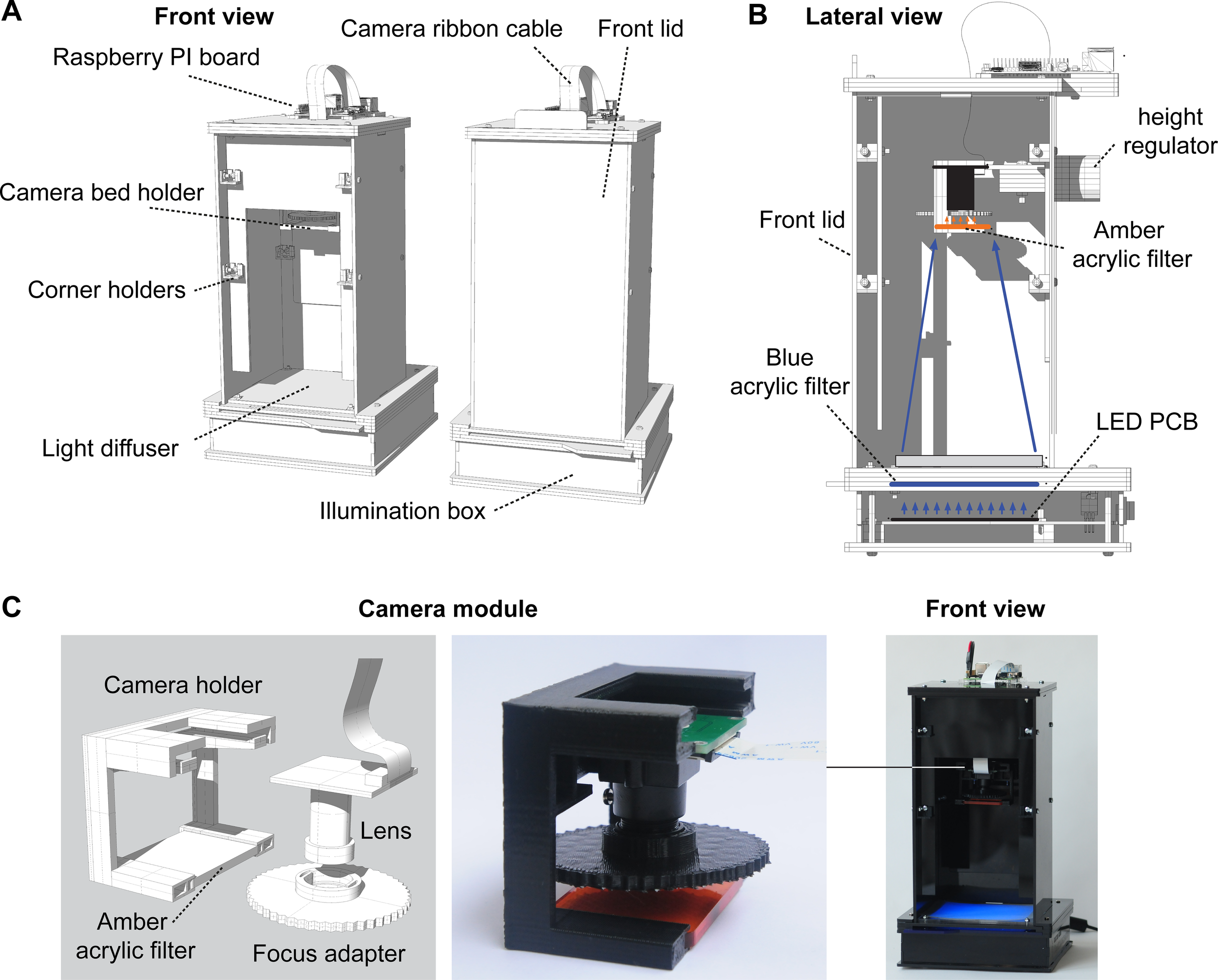The illumination and optics system consists of readily available 470 nm LEDs, a Raspberry Pi camera and a set of filters made with low cost acrylics and the box design and flexible focusing allows imaging in scales ranging from single colonies to entire plates. The team also developed a set of genetic components (e.g. promoters, coding sequences, terminators) and vectors following the standard framework of Golden Gate, which allowed the fabrication of genetic constructs in a combinatorial, low cost and robust manner. In order to provide simultaneous imaging of multiple wavelength signals, they screened a series of long stokes shift fluorescent proteins that could be combined with cyan/green fluorescent proteins for 3-channel fluorescent imaging.
Open source Python code was developed to operate the hardware to run time-lapse experiments with automated control of illumination and camera and a Python module to analyze data and extract meaningful biological information. To demonstrate the potential application of this integral system, the team tested its performance on a diverse range of imaging assays often used in disciplines such as microbial ecology, microbiology and synthetic biology.
Isaac Nuñez appreciated the opportunity to work on the project with the support of OpenPlant: “OpenPlant funds were important because we are generating a real impact in research and teaching through interdisciplinarity. This project not only introduced us to new modes of work based on good practices, documentation and open source licensing but also allowed us to learn from different fields such as open hardware, design, FOSS and advanced DNA fab methods.”
In order to highlight the benefits of employing an open framework, the team formed an industry partnership with the Open Source company Backyard Brains (TM), which has significant experience in creating and distributing open educational and research technology for neuroscience in Latin America and worldwide (backyardbrains.com, backyardbrains.cl). In collaboration, the team assessed the potential use of their imaging statuon in a high school environment. Author Tamara Matute explained “We have been able to use these resources in workshops in high schools, community spaces and cultural centres; and implement advanced practicals to teach in vitro synbio, DNA fab and microbiology. The open source and low cost nature of the resources has allowed citizens to better understand the principles behind gene expression analysis and modelling”
Together, their results demonstrate the successful integration of open source hardware, software, genetic resources and customizable manufacturing to obtain a powerful, low cost and robust system for education, scientific research and bioengineering. The paper was selected as Editor's Pick for the PLOS Open Source Toolkit Channel in December 2017.
Original Publication: Nuñez, I., Matute, T., Herrera, R., Keymer, J., Marzullo, T., Rudge, T., & Federici, F. (2017). Low cost and open source multi-fluorescence imaging system for teaching and research in biology and bioengineering. PLOS One, 12(11), e0187163.

![[Closes 24 Nov 2107] Apply now to the OpenPlant Fund!](https://images.squarespace-cdn.com/content/v1/54a6bdb7e4b08424e69c93a1/1509564315902-TUO4I6QRWI9TT8UGSIAJ/OpenPlantTwitter_400x400+%281%29.jpg)

![[Closes 7 Mar 2017] OpenPlant Research Associate (Haseloff Lab)](https://images.squarespace-cdn.com/content/v1/54a6bdb7e4b08424e69c93a1/1486552818859-FH76MCA8SMFU93WB85RX/OpenPlantTwitter_400x400.jpg)








